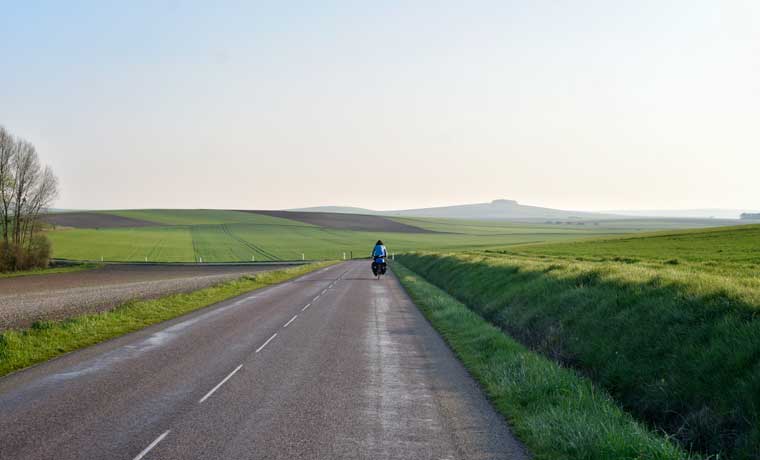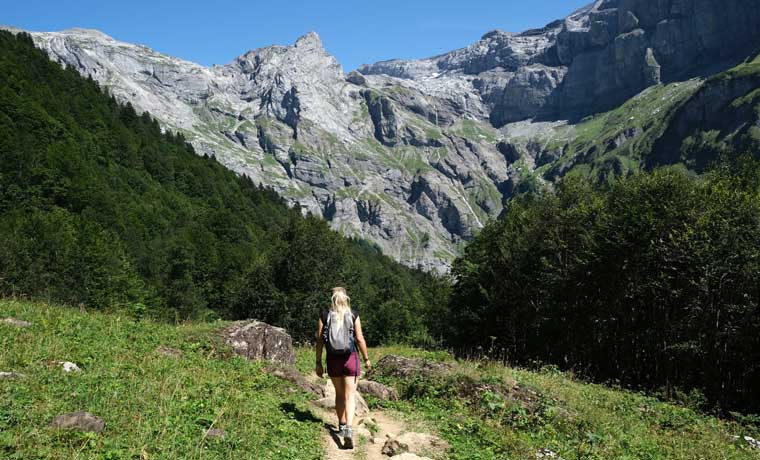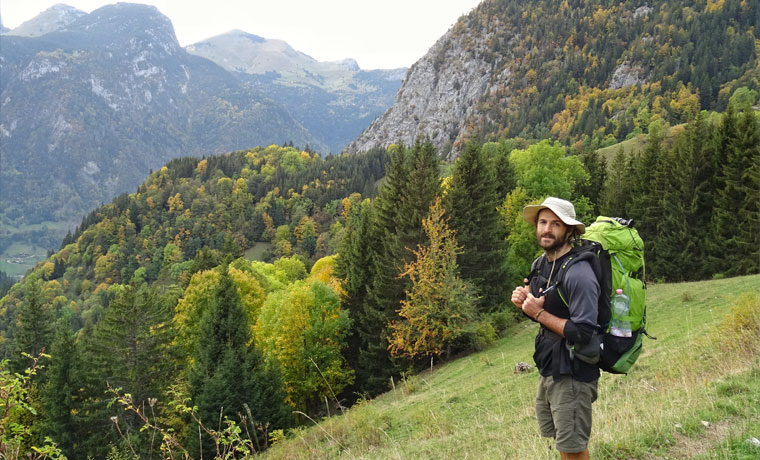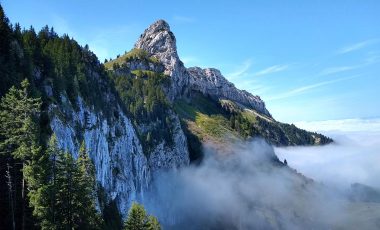Most of us know walking on the greener side of life is the right thing to do but sometimes the changes it requires aren’t so easy to follow. Don’t do this, cut down on that, completely avoid those. It can be a whole lot to think about. When you’re on the trail or on a well-deserved break from work, you don’t want to be thinking of things you shouldn’t be doing, right?
How to be a more eco-conscious adventurer
What if these steps to sustainability actually added to the adventure and made it more rewarding? It can be done! The tips below will help make your journeys more memorable, save you a bunch of cash and help protect the beautiful areas you’re exploring.
- Eco-conscious tips for before your adventure
- Eco-conscious tips for during your adventures
- Eco-conscious tips for after your adventures
Eco-conscious tips for before your adventure
01Pick the perfect location
Whether it’s your style to set off on a whim into the wilderness or plan for months ahead, it can all be done in a sustainable way by picking the perfect location, trail or activity.
Stand out from the crowd and choose an alternative destination that won’t be swarming with fellow wanderers. You’ll experience something fresh and new without all the preconceived expectations and photos to compare it with.
Think about the best time to go. Maybe you do want to visit a more popular location? Going during the shoulder seasons will help you beat the crowds and will likely save you some money too.
Another aspect to consider when planning is your impact on nature. Are there animals nesting, mating or migrating seasons that could make camping difficult, or pollinating periods for plants that could cause allergies? And what about energy or water shortages in less developed areas during high-season?
Besides helping you explore a unique, and crowd-free location and save you money, some places can deal with an unprecedented number of visitors whilst others simply cannot. Plan your trip so you don’t contribute to the environmental difficulties places like the AT or Everest Base Camp are suffering.
02Start the adventure from your front door
Turn transport into part of the experience by choosing more sustainable options. Rather than driving or flying from place to place, why don’t you consider trying to cycle, hitchhike or even hike from your house? Not sure if it’s even possible? Well, then it’ll likely be an adventure to remember!
Once you do arrive at a destination, go slow and explore it in the best way possible. Add to your outdoors experience by cycling, hiking, canoeing or kayaking – anything without a motor can add a unique spin to your trip.
Not sure if you can get there without flying? Picking a destination closer to home would cut your costs, the stresses of long-distance travel and you can explore more memorable transport options. Not to mention lowering your carbon footprint.

03If you need new gear make it a treasure hunt
Everyone loves new gear, but could that rucksack last one more journey? Will you need 7 spare memory cards? Even the most sustainable outdoors gear has a big environmental cost, so, as Patagonia said, ‘don’t buy that jacket’.
If your old gear really does have no life left in it, then recycle it and go on a treasure hunt. Buying second-hand gear in thrift/charity shops or online can be fun, a great way to give a second life to adventure items and will save lots of money!
You can find tons of online communities, groups and swap shops where you can trade your old stuff with others. It’s a great way to meet like-minded travellers and makes shopping a much more rewarding process.
04Always be prepared for the unexpected
Make sure you’re ready for any spontaneous adventures so you don’t miss out on any epic opportunities. These items are handy for everyday use and our advice is to keep them with you, or ready-packed for any last-minute trips:
- Metal cutlery and straw to limit plastic use
- A good quality Tupperware box to keep and pack food
- A solar charger
- Reusable bags for fruit and vegetables in shops
- Biodegradable bin bags to keep your rubbish as you travel or camp
- A good quality water bottle/water bladder and filter filtration tablets

Eco-conscious tips for during your adventures
05Embrace the natural world
Embracing the natural world is the best way to learn to love and protect it. For your next holiday, spend as much time outside as possible, whether that’s a beginner hiking trip, your first cycle tour or a wild camping adventure.
Some of these stunning natural areas you’ll find are also some of the most fragile, so it goes without saying you should tread carefully. Stick to the trail, try not to interfere with local plant or wildlife and make sure to leave everything as it was. That means leaving those shells on the beach, no matter how nice they might look in your bathroom.
06Spending the night under the stars
If you do want to spend time in the outdoors, camping is one of the best ways. Turn your one day hike into two or three days, spending the night in a tent, somewhere that will blow you away. Hopefully not literally…
When you’re nestled up in the heart of wild, this is when you’ll likely see nature at it’s most vulnerable – it’s especially important to do things properly. Do your best not to damage or disrupt the vegetation. Yes, that might be a beautiful spot by the lake for a tent but it’s not worth tearing up the plants and snapping branches.
If possible try and find a camping spot which has already been cleared. The same goes for fire. If fires are permitted, opt to use an already scorched pit, if available, rather than contributing to a patchwork of black dotes you realise once you watch your drone footage back.
07Listen to the locals
The locals know best so you should heed their advice. If you’re in a local shop or come across someone who lives in the nearby area, tell them about your plans and route. They can often fill you in on lots of unique aspects you wouldn’t have known about and ‘local secrets’ to find. They can also tell you of things you should be cautious of, like wild animals and hunting areas, which can literally save your life.
08Support the community
By opting for local food and products you’ll get to experience local customs and specialities whilst also cutting down on food air miles. Whether that’s a bluegrass night close to the trail or a traditional dance in a far-flung land, take the opportunity to embrace local events too. It’s the perfect chance to bridge ties between different communities, learn things from each other and likely give you some unforgettable memories.
09Give something back
Is it possible to help contribute to the local area? Maybe you could visit a local charity or reserve and make a donation? Maybe see if there are volunteering options?
Whilst you do have to be cautious volunteering, especially in developing countries, if you pick the right organisations and projects it can be a very enriching experience that will help you give something back to the area you’re visiting. Things like WOOFing or Work Away can be an awesome way to get an insight into local life, learn something new and benefit locals, whilst being easy to tie in with your other escapades.

Eco-conscious tips for after your adventures
10Tell the world
Whilst everything has its flaws, social media has the opportunity to be used for real good. If you’ve come back from your trip and travelled in a responsible way, tell people about it. That doesn’t mean bragging to the world about recycling your camping rubbish and endless photos of you and your reusable straw, but highlighting their importance is a really positive step. Change can come easily from your peers and the odd photo is an easy way to start it.
If you’ve found a new location which isn’t facing its own environmental issues, why don’t you suggest it to your friends? Maybe your buddies are wanting to complete Tour du Mont Blanc but you know there’s an equally impressive yet lesser-known route a short distance away? Suggest it to them and help promote positive tourism. You can also help promote any charities, natural reserves or sustainable initiatives you encounter on your trip. Share them within your social circles so they can spread the word too.
11Take care of your gear
Those boots will last a whole lot longer if you clean them up when you get back from that thru-hike. However tempting it might be to get back home, kick ‘em off and dump the rest of your gear until it’s next needed, however long that may be, don’t do it!
Clean your things, maybe even use products to recondition them and they’ll be fit for another day. This means you’ll save money and won’t be wasting a great pair of boots which could have plenty more life in them.
Thanks to Josh and Sarah Veggie Vagabonds for their inspiring and highly practical tips to start adventuring more responsibly.



